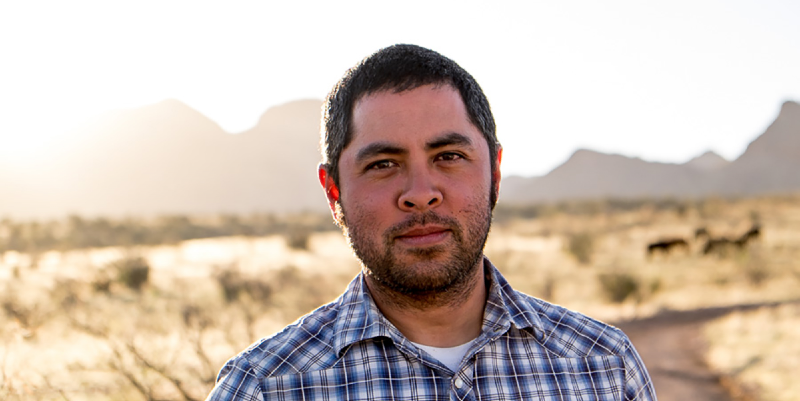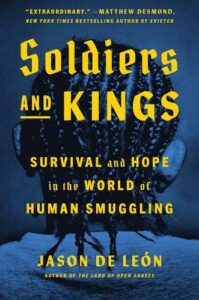Jason De León’s second book is the result of an exemplary commitment to what he and fellow anthropologists call “deep hanging out.” In Soldiers and Kings: Survival and Hope in the World of Human Smuggling, the UCLA professor and MacArthur Foundation “genius” grant recipient spends countless hours with people often written off as ruthless miscreants. On cable news and in pop culture, his subjects are known as “coyotes,” but De León suggests that guía—guide— “more directly reflects the work.”
For varying fees—these depend on what route is chosen and the cost of bribes paid to gangs, drug cartels and civil servants—the young Latin Americans in De León’s book lead groups of migrants bound for the US-Mexico border. Set against a backdrop of safehouses, smugglers’ homes and freight trains in Mexico and Central America, De León’s group portrait includes all sorts, from intimidating ex-cons to relatively easygoing 20-somethings who opt for smuggling over sub-$5-a-day manual labor. Attesting to the brutality and suffering inherent in their work, one of De León’s subjects gets stabbed and ends up dying in a hospital in Honduras, unable to pay upfront for the care he needs.
“I completely understand that because of the nature of their work they are unlikable, if not outright detestable,” De León writes. But smugglers are empowered by “the monstrous injustices created by capitalism” and “climate change patterns created by the richest countries and disproportionately felt by the poorest.” Indeed, two major hurricanes hit Central America within two weeks in 2020, “displacing hundreds of thousands of impoverished people.”
Speaking from his home in Los Angeles, De Leon talked about how he earns his subjects’ trust, why migrants need smugglers and what many Americans misunderstand about undocumented immigration.
At the start of your book, you say, “human smuggler and trafficker are very different things, a concept that popular media and the general public often fail to grasp.” What’s the difference?
One is sort of voluntary, the other is coerced. There’s obviously an overlap, and oftentimes, someone agrees to be smuggled and then gets trafficked. But nobody sets out to be trafficked. Some people definitely set out to be smuggled.
Why do migrants turn to smugglers, or guides, as they call themselves?
Migrants turn to guides in response to changes in border security. A hundred years ago, maybe you needed a guide, maybe you didn’t. You’re Chinese and you need to cross the Sonoran Desert because of the Chinese Exclusion Act. You might try it on your own or you might find a guy who knows the routes.
But starting in the mid-1990s, with the US policy Prevention Through Deterrence (this increased enforcement in populated border areas, forcing undocumented immigrants onto more remote, more dangerous routes), getting across the border becomes incredibly difficult. So to overcome these multifaceted enforcement practices, you need someone who knows the geography, someone who has contacts. And as there’s a need to migrate—whether it’s economic, climate change or whatever it might be—the response from the Global North has been to harden these borders. But migrants are not going to stop needing to get across these borders.
Who becomes a guide? As you make write, it runs the gamut from gang members to people who, like migrants themselves, are running from gangs.
It’s such a wide range. In our imagination, the people who become guides are criminal masterminds, but the low-level folks are just desperate people who need money. Maybe they’ve already been to the US and know the routes. And as organized crime has become more interested in taxing migrants, they need a smuggler.
Years ago, it was more of a mom and pop operation—a dude who knew some folks who would get you where you need to go. But with rising levels of violence, some gang members have a particular set of skills that allows them to handle this stuff. That’s a major shift. Twenty years ago, you wouldn’t hand your money to a hardcore gangster to get you across.
One of the men in your book had a job clearing brush for $2 a day. But as a guide, he made real money for a time, and he was in control of something for the first time in his life.
I think that’s part of the attraction. A lot of the guys who do it for extended periods of time are really smart. Unfortunately, it’s hard for them to translate their skills into more reputable businesses.
How much do they pocket from smuggling people?
They might clear $10,000 in a month of work. That’s if everything goes well. But a lot of times, they’re making a couple thousand max, and the lower-level guys are making a couple hundred. It’s boom and bust—it feels like you’re making a lot of money, but you’re actually not when you count the hours worked.
Some guides told you that they’d much prefer steady jobs and uneventful lives, but those things just aren’t available to them. Do you believe them?
I think a lot of them would be happy to toil in the US, where they could be making way more than they would in Honduras or someplace else. There are some other folks who are just in it for too long, and they don’t really want a straight job. Some of them are maladjusted to society in some way, and unfortunately that maladjustment has allowed them to succeed in other worlds—someone like Kingston. He would say to me, Look what’s happened to me in my life. What did anyone expect me to become other than what I am now?
Kingston has a big presence in the book. Before he was a smuggler, he was forced to join the Honduran military at around 14 years old.
Yeah, he’s just been groomed to be an aggressive person. He tried off and on to go straight, and it was one catastrophe after another. Some of it was self-sabotage, and sometimes when you’re in that world, people see you trying to get out and they don’t want you to. Like, once you’re in, you’re in.
How do you show someone like him that you’re not going to get him into trouble, that you just want to be an observer?
Part of it is just time. Ethnography is so difficult because it just takes so long to do, just to build that trust. What I’ve found is that when I go back the second time—after I’ve been there for a while, leave and then return—people recognize that I wasn’t lying to them.
As far as the deep hanging out, it’s committing myself to a lot of boredom. That was a surprising thing with smuggling—how much boredom there is. Sometimes you’re just sitting around listening to music, drinking beer, waiting for something to happen. Which is probably why I’m good at it, because I like listening to music and drinking beer. I’m very patient in that sense. Once you’re that bored with someone, they recognize: Oh, you really just want to be here and you’re trying to figure this out, there’s no alternative motive.
Maybe it’s boring sometimes, but your work is also dangerous. One of the guys you got to know was murdered. How do you approach mental health and physical safety?
It was rare that I felt like I was in danger physically, probably because a lot of the guys I’ve worked with saw that I was trusting them, and they did a really good job of reassuring me that things were going to be OK.
The thing that I didn’t really anticipate was the mental toll that this took on me. I stopped going to therapy in graduate school because I was like, I’m totally fine, everything’s great. This book sent me back into therapy and got me thinking about a lot of personal things. It took me to these dark places, but it was really important for me to go to those dark places because as I sit here now, I think I’m the happiest and most well-adjusted that I’ve ever been in my entire life.
Both of your parents were in the military, and you moved around a lot as a kid. You think that informed your decision to go into anthropology?
For sure. I need alone time, but I also like to be around people most of the time. Part of the desire to be around people was from this deep sense of isolation and loneliness that came from always being the new kid in school and moving around so much. There are lots of anthropologists who were Army brats, or their parents were diplomats or missionaries, just moving around. I think that builds a person who has some comfort in those new cultural spaces.
What do people who consider themselves well-informed maybe not understand about migration? What are the biggest misconceptions?
That it’s stoppable. We need to think about migration not as something to be stopped, not something to be dealt with at the US-Mexico border, but something to be talked about and dissected and understood for all of its complexity. We waste so much money at the US-Mexico border, and it doesn’t work. The US has a deep need for undocumented labor, which is one thing that I think the American public doesn’t want to admit.
The other thing we have to admit is that there is no wall that is going to stop climate change or stop poverty. People are going to keep coming. And the approach that we’ve been using—the border wall and infrastructure—is just not sustainable.


















